Adolescent Girls Embrace their Period
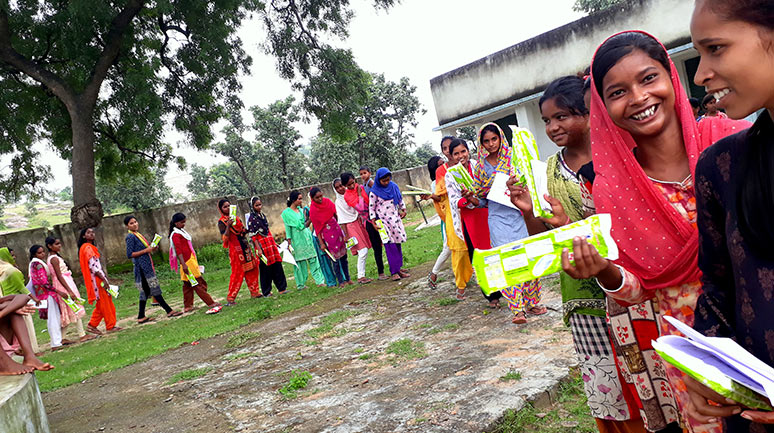
By letting go of the shame and secrecy that girls experience about having their period and by openly having discussions and understanding about why they have a period every month, the girls are sending a very powerful message, challenging their subjugation in society

Breaking the stigma: Girls walk through the village with sanitary pads in their hand. Pad Abhiyan (Sanitary Pad Campaign) in Kuki village, Jhalda-I block, West Bengal.
Breaking the taboo around menstrual hygiene, the adolescent girls of six villages in Jhalda I block started a campaign called ‘Pad Abhiyaan’. They marched through their village with sanitary pads in their hands, unaffected by the men and boys watching them. “It is our blood; it is natural so why should we feel ashamed talking about it,” said Sonamuni, who participated in the campaign.
Some two years back (in 2018), Pratima, now in class IX, had her first period. Afraid that she had contracted some disease, she didn’t tell anyone. “I bled, in pain, for six days. I thought I had committed some sin. I did not go to school and because it was the paddy transplanting season, my mother, who was always in the field, did not notice. My first period went like that. Later, my school friends told me about it and asked me to use an old cloth during my period.”
“Here, it is like this…we get to know about periods from our friends. My mother never told me anything. She only told me to isolate myself from the family and asked me not to pray or touch any puja-related thing,” said Malati, a class VIII student.
Menstruation, a biological process and one of the important phases in the life of a girl, remains a blotch, a stigma, seldom spoken of openly in families. This is beginning to change in Jhalda I block of West Bengal’s Purulia district, where open discussions, knowledge and awareness around menstruation are slowly helping girls and their mothers to gracefully embrace their period.
I bled, in pain, for six days. I thought I had committed some sin. I did not go to school and because it was the paddy transplanting season, my mother, who was always in the field, did not notice. My first period went like that.”
Pratima, a class XI student
Initiating Discussions on Menstruation
I n December last year, we had a discussion on early marriage and puberty with Federation leaders and Change Vectors in Jhalda. Change Vectors are women volunteers from SHGs, trained in different aspects of health and nutrition and who, in turn, create awareness and collective action around various issues such as healthy eating, dietary diversity, child care and hygienic practices in their own villages. During the discussions, the women said that once a girl attains menarche, or the first menstrual cycle, her family is afraid that the girl may get pregnant and bring shame to the family. Hence, people prefer to get their daughters married early (as per Federation members, girls usually get married between 16 and 17 years). Further discussions revealed that conversations around menstruation do not happen in families. Women find it very awkward to discuss issues such as menstruation and puberty with their daughters.
The training focused on what menstruation is, why it occurs and what are the physical changes that happen in the body during menstruation. Discussions on healthy eating, and health and hygiene were conducted through the use of case stories and other IEC material. Women realized that these discussions are very important and that all women, especially girls, should be encouraged to participate in these sessions. One of the leaders, Gayetri Mahato, said, “Although we are Federation leaders and trainers and we talk to so many people, we are so ignorant about menstruation, menstrual health and hygiene. We fully understand how the women and girls in our area, who know nothing about menstruation, suffer in silence.” At the end of the training session, the Federation leaders and the Change Vectors decided to jointly focus on adolescent girls and take serious and urgent action for their menstrual health and hygiene.
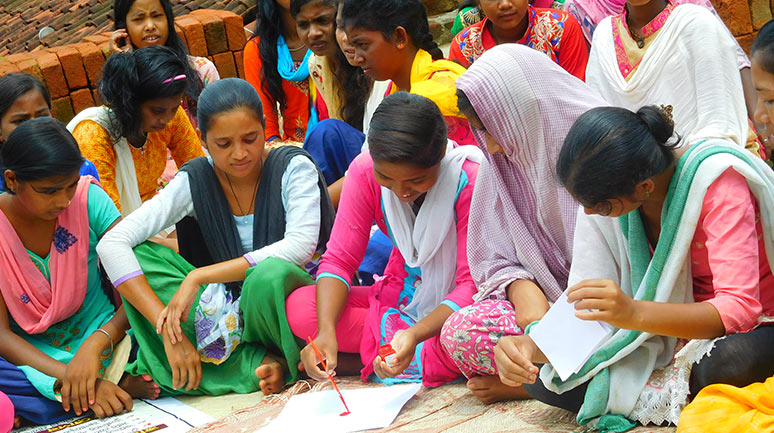
Ice-breaking activity with adolescent girls during an FGD in Putidih village, Jhalda-I, West Bengal
Understanding the Issues of Adolescent Girls
B efore initiating any action to address the issue, a study of the current scenario of adolescents in the operational area was very necessary. A survey of 187 adolescent girls (school-going and dropouts) was done by the Change Vectors, with the support of PRADAN. And six focused group discussions (FGDs) were conducted in six villages, namely, Putidih, Panri, Kuki, Chirutarh, Mohukudar and Nowagarh. Adolescent girls from various communities were approached to understand the challenges and issues regarding menstrual health. Some of the findings from the FGDs are:
- Almost all school-going girls shared that they support their family in work such as livestock-rearing, farming, bidi-making, household chores and taking care of their younger siblings.
- None of the girls, who participated in the FGDs, was informed about menstruation before the onset of their menarche. During menarche, neither their mother, other family members or teachers had spoken to them about menstruation or had guided them on how to handle it.
- The girls shared that restrictions on them increased with the start of their period. Talking with boys is strictly not allowed. They said that they would meet boys in school and not tell their families.
- The girls also shared that they speak and learn about menstruation from their peers. And those girls, who have dropped out of school, have very few peers they can share this with.
- Most of the girls use old cloth during their period. Many said they change the soiled cloth the next day. This means they use the same cloth for 24 hours.
- They wash and reuse the cloth. However, none of them dries the cloth in direct sunlight. They hide it under another cloth. This ‘menstrual’ cloth is used for 5–6 months until it is torn.
- Of the 187 girls, 13 girls use sanitary pads, 152 girls use cloth and the remaining 22 girls said that they neither use sanitary pad nor cloth during their periods.
- Many shared that they get cut marks on their thighs because the cloth gets hard after prolonged and repeated use. Many girls said they suffer from itching in their private parts.
- Many girls said they feel tired and weak.
- A few of them said that they have used pads. One of their concerns about using sanitary pads is that these are not available in the village. The other concern is the disposal of these pads. Women and girls threw the used pads near ponds in the village. They found that, slowly, these pads flow into the ponds and get entangled with the hands and legs of the villagers, who bathe in the ponds. Naturally, this gives rise to chaos among the villagers, who blame each other for the mess.
- The girls said that the cost of a sanitary pad is very high and cheap pads are of very poor quality.
- The girls shared that, during menstruation, they face various taboos such as they cannot do puja; they have to stay separately; and they are permitted to eat only vegetables and never meat in any form.
- They shared that they would often miss school but had to do their household chores despite being in pain.
- Some schoolgirls said that although they receive iron and folic acid (IFA) tablets once in three months, they were not aware why they were given it. Many said that they throw away the tablets.
Here, it is like this…we get to know about periods from our friends. My mother never told me anything. She only told me to isolate myself from the family and asked me not to pray or touch any puja-related thing,
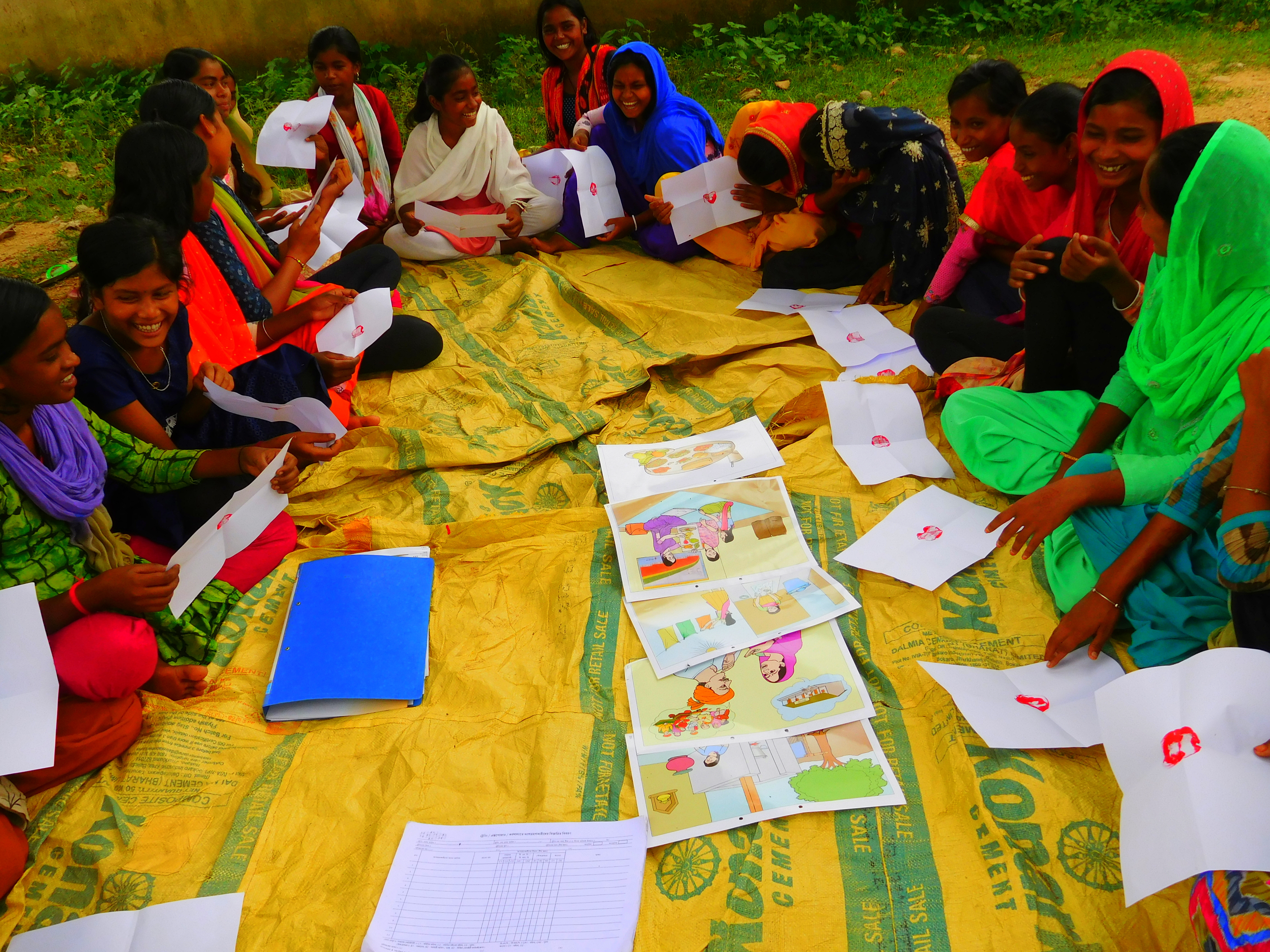
Training session on menstruation through story-telling, using picture cards in Putidih village, Jhalda-I block, West Bengal
Breaking the Stigma
T he FGDs and the surveys reveal the need for open discussions on menstruation to break the stigma around it. For this, three levels of initiatives were taken. These were:
Open discussions between mothers and daughters: Open discussions help mothers and daughters to talk freely about their fears and challenges, and help understand each other’s points of view. The girls talked about the challenges and issues they faced whereas their mothers spoke about their fears that the girls may get pregnant if their movements are not controlled. There were discussions on how girls longed for their mother’s love and affection, guidance and support. The mothers, on the other hand, expressed the need for respect.
When we walked through the village, some boys and men started laughing at us. We were supported, however, by a Change Vector didi, who led the way. Initially, we felt shy; later, it didn’t bother us,”
Sabitri, a 14 year old girl
Training on menstruation: With the help of the Change Vectors, a training module was run for adolescent girls. Although it had been decided that the training would be conducted in the school by school teachers, this could not be done because of the lockdown. Village-level trainings on understanding the menstrual cycle, menstrual hygiene and a healthy diet were organized for the girls. Picture cards were used to show the story of 12-year-old Shila and her experience of menarche. The adolescent girls in the meeting discussed Shila’s story and, through this, enhanced their learning. “I never knew that it is so important to change the cloth during my period. From now on, I will wash and take a bath regularly during my period,” said Kabita, a 13-year-old girl. Mamata, age 14, said that she would eat green leafy vegetables and would take the IFA tablets regularly because she now understood how important it was for her health.
The girls were also shown how to use sanitary napkins. Because the disposal of sanitary napkins is a big issue, biodegradable Bloom sanitary pads were ordered from Kolkata on a trial basis. A small pilot was done to see if the pads are biodegradable and comfortable to use. “We dug a hole in the earth, put the soiled pad in it and marked the place. A month later, we checked if the pad had decomposed. Some pads had started getting decomposed. We had so much fun doing this activity. It was for the first time that we talked so freely about our period. We didn’t have any hesitation,” said Sumitra cheerfully.
Starting a campaign on menstruation: With the support of their mothers and the Change Vectors, the girls started a campaign called ‘Pad Abhiyan’. In the six villages, where FGDs were held, adolescent girls marched with pads (sanitary napkins) in their hands and raised slogans against menstrual stigma. “When we walked through the village, some boys and men started laughing at us. We were supported, however, by a Change Vector didi, who led the way. Initially, we felt shy; later, it didn’t bother us,” said Sabitri proudly after participating in the campaign.
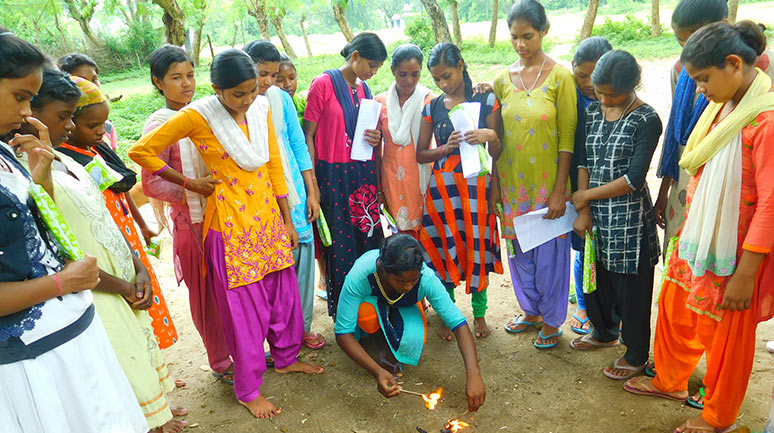
Witnessing a fire test being conducted by a girl in Chirutarh village, Jhalda -I block, West Bengal, to check if sanitary pads are biodegradable
The Federation Takes Charge
F ederation leaders decided that awareness and training about menstruation need to be part of a Federation’s community action plan. The survey, as well as the FGDs, highlighted the need for the availability of low-cost, biodegradable sanitary pads. Currently, with the help of PRADAN, the leaders are contacting different organizations that provide low-cost napkins. They are also developing a business model, in which the Federation buys the sanitary pads in bulk, and these are made available, through the Change Vectors, at the village level.
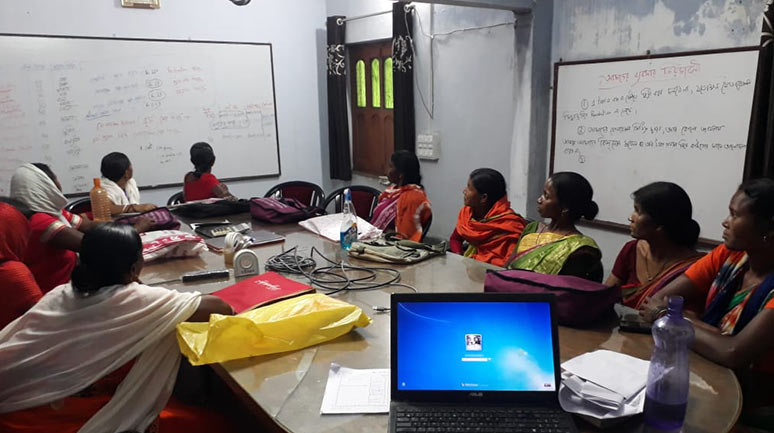
Federation leaders and Change Vectors, at the PRADAN office, Jhalda-I block, West Bengal, discussing the business model for sourcing sanitary pads
Embracing the Period
S tigma and taboos around menstruation are universal. In rural areas, the lack of awareness about menstruation and the lack of basic facilities such as healthy food, sanitary pads, toilets and health services further intensifies the problem. This has far more profound ramifications such as restricted movement, school dropouts and early marriage. The need is, therefore, to create awareness about menstruation, generate open discussions in schools and families, and provide a supportive environment to girls so that they do not feel ashamed about, but rather embrace, their period as a natural phenomenon and a part of the experience of growing up.


1 Comment
Go ahead, many more works to be done.